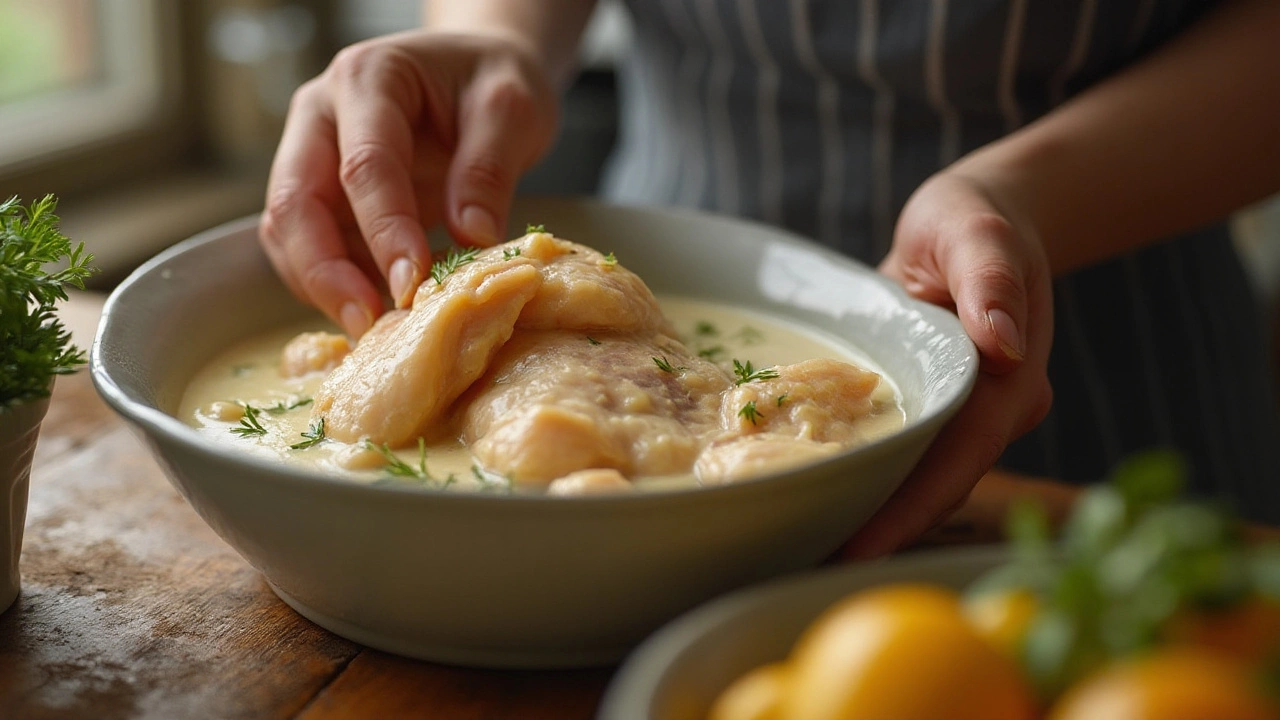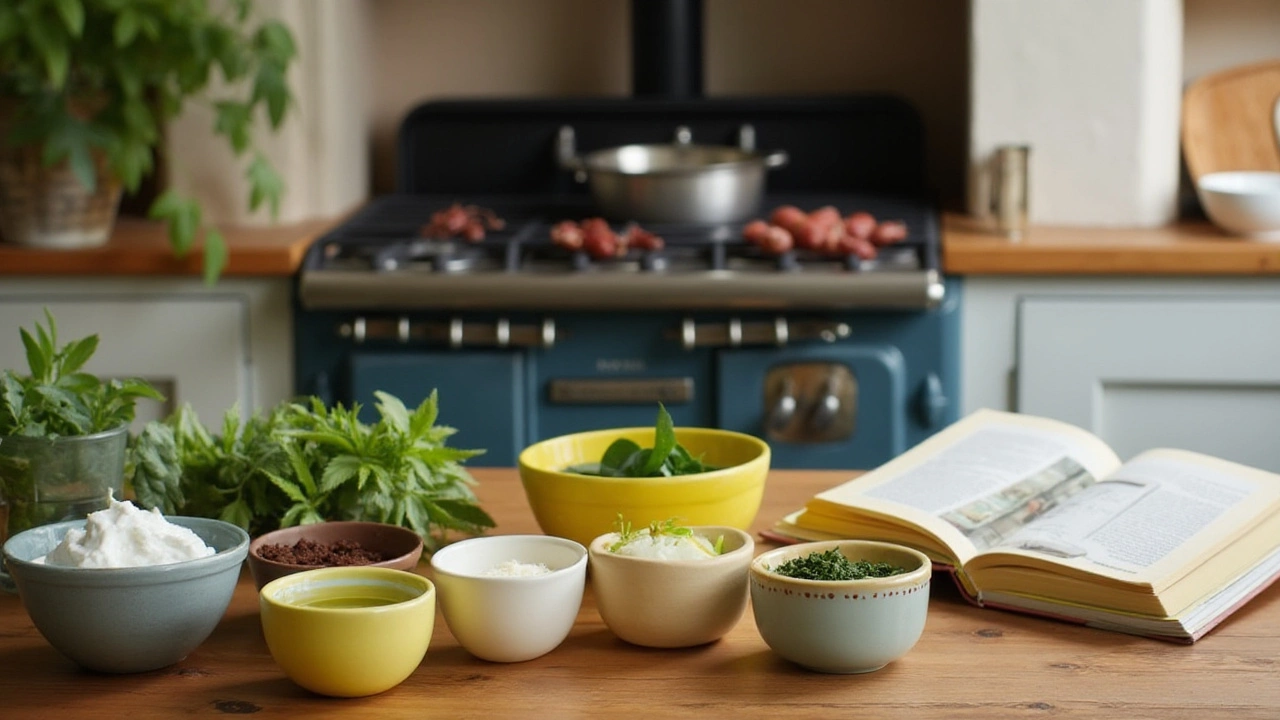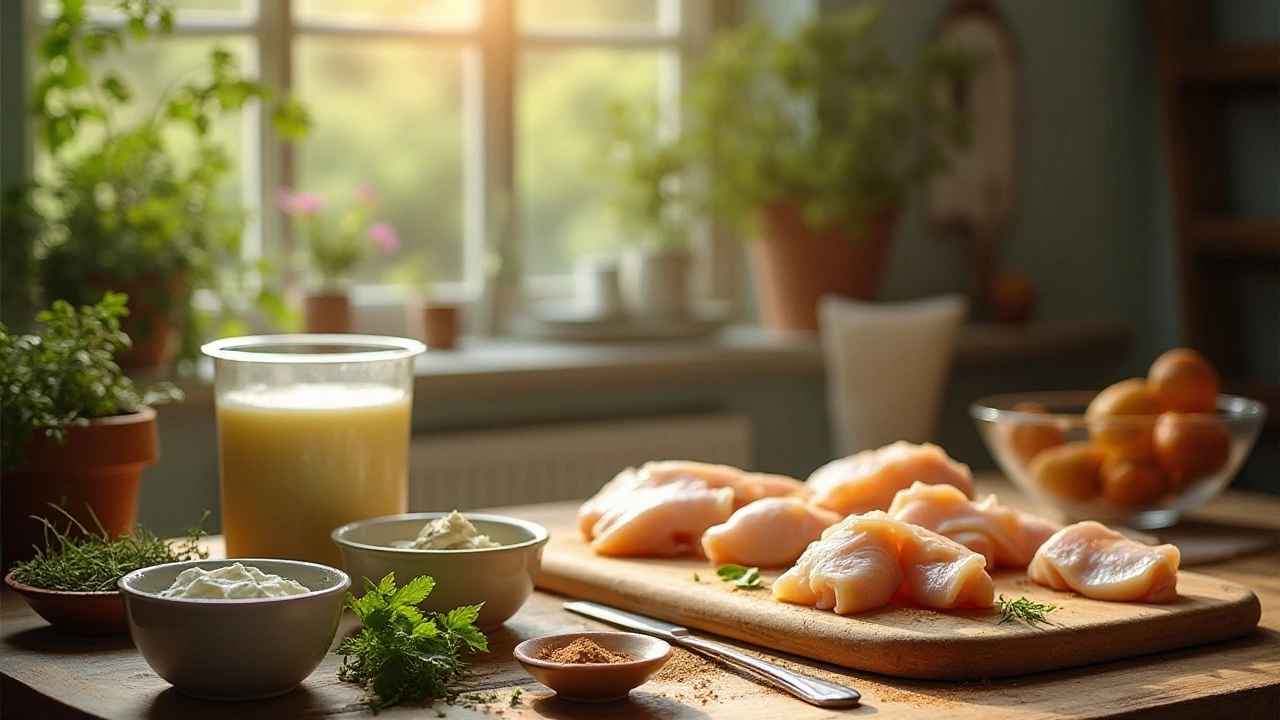The journey to perfectly tender chicken often starts before the bird even hits the oven or grill. Understanding the art of marinating can mean the difference between dry, chewy meat and a luscious, juicy meal that leaves everyone reaching for seconds. With a blend of common kitchen ingredients, you can elevate your poultry to new heights of tenderness and flavor.
Marinades not only impart their savory goodness into the chicken but also work chemically to break down proteins, creating a softer texture. This dual role is what makes them indispensable to any cook's repertoire. Whether you're prepping for a casual family dinner or trying to impress guests, knowing how to properly soak chicken will undoubtedly enhance your culinary prowess.
- Understanding Tenderness in Chicken
- The Science Behind Marinades
- Marinade Magic: Ingredients for Tender Chicken
- Practical Tips for Marinating Chicken
- Common Mistakes to Avoid
Understanding Tenderness in Chicken
The quest for tender chicken often leaves cooks wondering what makes one piece irresistible while another disappoints. The key to achieving that melt-in-your-mouth quality lies in understanding the meat's unique composition. Chicken, like all meats, is made of muscle fibers intertwined with connective tissue, primarily collagen. As the chicken cooks, the collagen needs to be transformed into gelatin, a process that depends heavily on the cooking method and time. Larger, older chickens have more developed muscles and tougher connective tissues, demanding specific techniques to ensure they reach their tender potential.
How you prepare the chicken before cooking also has a significant impact. When you marinate, you aren't just adding flavor. Marinades can penetrate the outer layers of muscle fibers, where they work to soften the meat. An acidic component, such as lemon juice or vinegar, starts breaking down proteins, which makes the meat more pliable. Other ingredients, like dairy or enzymatic fruits such as pineapple (though in moderation), contribute primarily to tenderness, disrupting the molecular structure of proteins. The right balance in a marinade can significantly affect the final texture.
Marinades with enzymes are known to tenderize meat by breaking down its proteins. A well-made concoction often consists of an acid, an oil, and seasonings. This not only tenderizes but also boosts the flavor. Buttermilk is a classic choice for soaking chicken; its acidity and calcium activate enzymes in the chicken to break down proteins. As the doughy favorite of Southern kitchens, it yields exceptionally juicy chicken – no wonder it's the secret behind many family recipes.
A famous chef once said, "A good marinade respects both the nature of the meat and the flavors you're trying to impart." This wisdom highlights the necessity of a considered approach to enhancing chicken's tenderness.
It’s crucial to remember that every type of meat, including chicken, has its own unique factors that influence tenderness. Placement in poultry matters — the muscles of the chicken that get used less, such as the breast, naturally remain tender. However, those that are regularly utilized, like the legs and thighs, boast a firmer texture. Cooking practices, like braising which gently breaks down tougher sections over time, can transform any piece into a masterpiece of succulent meat. The best results often come from combining knowing your cut with the right preparation method. For a more scientific perspective, studies show a clear correlation between correct marinating times and tenderness. This means fresh flavor is just one soak away from enhancing your dish, making flavorful chicken not just a delight, but an art form.
The Science Behind Marinades
Marinades perform their magic by tenderizing and flavoring the meat, and they rely on a blend of chemistry and flavor profiles to do so. When you soak chicken in a marinade, you're engaging with the proteins in the meat at a molecular level. The science hinges on two primary factors: acid and enzymes, each bringing their unique properties into the mix. Acids, found in ingredients like lemon juice or vinegar, work to break down the proteins. This softens the meat, making it more palatable. They don't just tenderize, though; acids promote deep flavor absorption into every part of the chicken.
Enzymes, on the other hand, are the unsung heroes hiding in pineapple juice, papaya, and yogurt. They go beyond the scope of acid work by unraveling muscle fibers and connective tissues within the chicken, making them mellower to chew and digest. The beauty of using a concoction of enzymes and acids lies in their cooperation, giving your dish that extra punch of flavorful chicken and softness, achieving a balance that’s both delightful and effective. The synergy between marinades’ acids and enzymes is why many seasoned cooks swear by their concoctions. As renowned food scientist Harold McGee once noted, “The chemistry of cooking is constantly active, an unseen yet potent contributor to our gastronomic experiences.”
Beyond just acids and enzymes, marinades tap into other key elements, like oil and spices, which round out the composition. Oils form a protective layer around the meat, which helps to keep moisture locked inside, ensuring the chicken remains juicy during cooking. They also assist in binding spices and seasonings to the chicken, ensuring a robust taste explosion with every bite. Spices and herbs enhance the unique character of the dish. Each part of the marinade, from salt to sugar, plays a protective role over time, preserving the chicken's innate moisture while imparting varied textures and tones.
| Marinade Ingredient | Key Function |
|---|---|
| Acids (like lemon juice) | Tenderize and infuse flavor |
| Enzymes (from yogurt) | Break down protein fibers |
| Oils | Seal in moisture and bind seasonings |
| Spices | Add distinct flavor profiles |
Finally, timing matters when it comes to the effect of marinades on the chicken. It’s a dance of patience and preparation. Letting your chicken soak for an optimal period—usually a few hours to overnight—can dramatically increase tenderness without overwhelming the meat's natural flavors. But beware, leaving it for too long under acidic conditions can ironically toughen the chicken once more. Achieving perfect tender chicken is less about chance and more about understanding these culinary principles and employing them wisely in your cooking adventures.

Marinade Magic: Ingredients for Tender Chicken
Diving into the realm of marinades, one might wonder what alchemy lies behind these liquid concoctions. It's truly fascinating to realize that certain simple ingredients have the power to transform the humble chicken into a succulent masterpiece. The key to this lies in their ability to tenderize while infusing rich flavors. When selecting ingredients, a well-balanced mix of acid, fat, and seasonings is crucial to achieving the desired outcome.
Let's begin with acids like lemon juice, vinegar, and yogurt. They play a critical role in breaking down proteins in the chicken, which softens the meat and allows it to absorb other flavors more effectively. While lemon adds a bright, citrusy flavor, vinegar can provide an earthy tang, and yogurt imparts a creamy tartness. There’s an art to using these, as too much acidity can lead to a mushy texture. It's all about achieving the right balance.
Next, we look at the role of fats, often contributed by oils such as olive or sesame. These play an essential part in forming a protective coating on the chicken, which retains juiciness and prevents it from drying out during cooking. Moreover, fat acts as a medium, carrying aromatic spices and herbs deep into the meat. An interesting fact is that sesame oil not only enriches the marinade with a nutty aroma but also has a relatively high smoke point, making it ideal for grilling.
Spices and herbs form the aromatic backbone of any great marinade. From the classic garlic and rosemary combination to exotic blends like cumin and coriander, the possibilities are endless. Garlic, for instance, not only imbues flavor but also contains sulfur compounds that contribute to the tenderizing effect. Fresh herbs such as basil or cilantro can brighten up the dish, making it more vibrant and inviting.
"Marinades are not just about flavor," says culinary expert Harold McGee. "It's about enhancing the texture and quality of the chicken, turning it into a culinary experience."
Incorporating these elements into your marinade involves a fine-tuned balance that can be perfected with practice. A general rule of thumb is to marinate the chicken for at least one hour, but not exceeding twenty-four hours, to prevent the acids from toughening the meat instead. It's always exciting to experiment and adjust quantities, discovering your own secret formula for tender chicken that tantalizes taste buds.
Finally, don't forget the importance of sugar, often an unsung hero in marinades. It aids in the Maillard reaction during cooking, creating an appetizingly caramelized crust. Whether it's honey, brown sugar, or a splash of fruit juice, incorporating a sweet element can add depth and complexity to the flavor profile. With these ingredients at your disposal, crafting the perfect marinade becomes an enjoyable and rewarding culinary journey.
Practical Tips for Marinating Chicken
To achieve tender chicken with every meal, mastering the art of marinating is essential. Start with fresh, quality chicken, as the success of your dish heavily depends on it. Begin by understanding the type of marinade that pairs best with your chosen cut. For instance, thighs and drumsticks, with their richer flavor and higher fat content, pair well with stronger, bolder marinades, while tender breasts require a gentler touch to avoid overpowering their subtle taste. It's also important to consider the balance of acidity and fat in your marinade, as both play crucial roles in breaking down protein fibers while keeping the meat moist.
When you're ready to marinate, aim for a balance of liquid and solid ingredients. A good rule of thumb is one cup of liquid for every pound of chicken, allowing enough coverage for the meat to soak the flavors. Popular liquids include buttermilk, yogurt, and vinegars which contain acidic elements that can tenderize the chicken. Adding flavorful herbs, spices, and aromatics will enhance the taste. Always remember to give your marinade ample time to work its magic—at least 1-4 hours for chicken breasts, and 8 hours to overnight for tougher cuts like thighs and drumsticks.
"For perfectly tender chicken, use marinades that marry acidity and fat. They help to tenderize and inject flavor deep into the meat," advises culinary expert Harold McGee.
Avoid marinating chicken in metal containers, as certain metals can react with acidic components, altering the taste. Instead, opt for glass, plastic, or food-grade bags. Rotate the meat occasionally, ensuring the marinade penetrates evenly. Moreover, patience is key. Quick soaks may infuse some taste but will not achieve the thorough tenderness you’re aiming for. Practice patience, and you will be aptly rewarded with each succulent bite.
Additional Tips to Keep in Mind
While marinating, ensure the chicken is always refrigerated. At room temperature, harmful bacteria can develop, posing health risks. Cover your marinating container or seal the bag tightly to prevent any odors from other fridge items from seeping into your chicken. Once marinated, remember that any leftover sauce needs to be discarded or boiled before using as a sauce, as raw chicken juices can contaminate it.
Finally, avoid over-marinating. Although tempting, leaving your chicken submerged for too long can turn it mushy—a culinary pitfall best avoided. Follow these insights, and your journey to consistently creating irresistible, flavorful chicken will be well underway. By applying these techniques, each dish you serve will undoubtedly be met with enthusiastic approval and culinary satisfaction.

Common Mistakes to Avoid
Even the most experienced cook can fall into the trap of a few common pitfalls when it comes to marinating chicken. One of the most frequent mistakes is over-marinating. People often think that more time spent soaking in those flavorful juices automatically means a better outcome, but what they don't realize is that over-marinating can lead to mushy, unappetizing chicken. The acids or enzymes in many chicken marinades can become too harsh if left for too long, breaking down proteins excessively and compromising texture.
Another misstep is not considering the container. Reactive containers like aluminum or cast iron can alter the taste of your chicken as the acidic components of the marinade interact with the metal. Instead, opt for non-reactive containers like glass or plastic to avoid any unwanted metallic flavors. Additionally, failing to refrigerate during marination is a significant blunder. Room temperature can promote bacteria growth, so it’s crucial to keep marinating chicken chilled for safety and quality.
"Marinating chicken can transform a meal, but understanding the science behind the soak will take it to another level," says Liz Nordeen, culinary expert at Cuisine Institute.
Let's not forget the significance of balance in your marinade. A harmonious blend of acid, oil, and seasonings ensures not only flavor penetration but also that your chicken remains moist. Too much acid without balancing ingredients can lead to tough, rubbery results rather than the desired tender chicken. Also, it’s important to pat chicken dry before cooking. While this may seem trivial, excess moisture on the surface can prevent the formation of that lovely crust or skin we all crave, and additional water can prematurely steam your chicken instead of searing it.
Lastly, ignoring time post-marination before cooking is a slip-up to watch out for. Allowing the meat to rest at room temperature for a short period allows even cooking, ensuring the outside doesn’t dry out before the inside cooks through. Always remove the chicken from the marinade and let it sit for about 20 minutes before it hits the heat. This simple step ensures your flavorful chicken is cooked to perfection without any unpleasant surprises.

